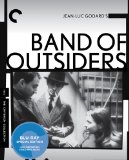| Reviews & Columns |
|
Reviews DVD TV on DVD Blu-ray 4K UHD International DVDs In Theaters Reviews by Studio Video Games Features Collector Series DVDs Easter Egg Database Interviews DVD Talk Radio Feature Articles Columns Anime Talk DVD Savant Horror DVDs The M.O.D. Squad Art House HD Talk Silent DVD
|
DVD Talk Forum |
|
|
| Resources |
|
DVD Price Search Customer Service #'s RCE Info Links |
|
Columns
|
|
|
Band of Outsiders: The Criterion Collection
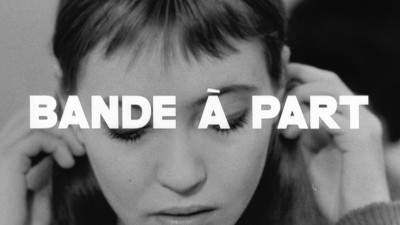
Please Note: The images used here are from promotional materials and stills provided by Criterion, not the Blu-ray edition under review.
It's no coincidence that, of all the multifarious masterpieces the great French filmmaker Jean-Luc Godard has given us over the years and decades, it's 1964's Band of Outsiders (Bande à part) that revved American auteur Quentin Tarantino's motor, to the point that every Tarantino film opens with the tributary title "A Band Apart" (the name of his production company). Band of Outsiders is richly, excitingly exemplary of "classic" Godard, from his most prolific, pop-culture-obsessed, and cinephilic period, before the moral/political sensibility of this most bluntly intellectual of filmmakers, outraged by Vietnam and a thousand other injustices, took a bold leap away from movie-love-drenched narrative to the more reflective, essayistic, historical, politicized, and frankly challenging mode of his much less popular, much more divisive later work (Tout va bien, Numéro deux, Film Socialisme). To be sure, Band of Outsiders's fun and sense of play are in service of what the director/onetime film critic had referred to as only a continuation of his film criticism, only now from behind the camera. But here, Godard is still finding it feasible to practice a celebratory kind of film-as-film criticism, and it's this breathless quality, this impulse to mine all of the affective, intellectual, and aesthetic possibilities of his medium, all at once, that makes this picture, for all its typically Godardian self-consciousness and coolness, such a readily accessible rush, flippant and fleet enough to be a catalyst for the future, freely and cleverly expressed fan-letter pop-culture witticisms of a Tarantino.
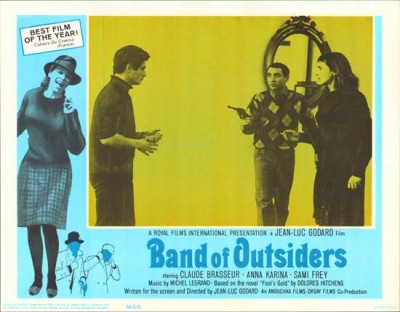
Call it Pulp Shakespeare: Godard takes his simple story of a beautiful, youthful love triangle with criminal tendencies (from a série noire/crime-fiction paperback, American novelist Dolores Hitchens's Fool's Gold) and spins it out centrifugally into something that spans, overlaps, and commingles the "highest" poetry and drama with the "lowest" gangster pictures, lurid tabloid-ism, and comic books, highlighting the resemblances and similarities between "high" and "low" modes in a way that still feels invigoratingly, starkly modern and radical. Thus, the heist-gone-wrong and the unpredictable ebb and flow of romance and betrayal between the raffish, thuggish Franz (Sami Frey, Who Are You, Polly Magoo?), the sensitive and handsome Arthur (Claude Brasseur), and Odile (Anna Karina, Vivre sa vie), the naïve girl living with her rich aunt in a temptingly isolated house, comes to us in the most fragmentary, digressive way, in fits and starts with multiple interludes of philosophizing or otherwise musing free-association that work to create that strikingly cool, referential, yet replete and riveting tone for which Godard is (in)famous. A very extended scene of the trio's English teacher declaiming on Thomas Hardy, quoting T.S. Eliot ("Everything that is new is thereby automatically traditional"), and reading aloud some oddly resonant passages from Romeo and Juliet, is our Rosetta stone for getting the sparks flying from the film's classical/modern clash, as well as the tragic implications of the erotic and tender feelings between Franz (or will it be Arthur?) and Odile. Scenes of action, wherein the reluctant but besotted and excited Odile is cajoled and seduced into letting the two would-be thieves into her aunt's home for an ill-planned and unexpectedly deadly robbery of stacks of hidden cash, sit in seeming tonal discontinuity alongside near-documentary street scenes soundtracked cacophonously by the direct-recorded urban noise, or plaintively by Odile's impromptu singing on the Metro, or by Godard's jarring yet lyrical narration sketching out what Odile, Arthur, and Franz are feeling, brusquely filling in any late arrivals to the theatre on the film's plot so far, or incongruously but beautifully encapsulating the texture of the three protagonist's raw and gritty-looking experience with language borrowed from Rimbaud's poetry.
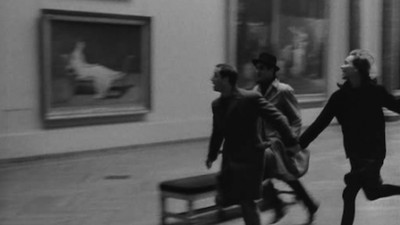
And then there are the many memorable moments when Godard uses the narrative as nothing but a springboard from which to launch into flights of cinematic inspiration: Much has been made, for example, of his camera eye's contagious gravitation toward his then-wife Karina, and that sweet, simple, classical brand of star-iconography is particularly remarkable in Band of Outsiders, Karina's expressive, isolating, worshipful close-ups rendering her (permanently -- such is the awesome immortality of celluloid) as captivating and luminous as any silent-movie queen of yore. And mixed into the film's typically spontaneous, on-the-fly "reportage" filming technique (crafted with a sharp but always-flexible eye by Godard's intrepid go-to cinematographer of those years, the superb Raoul Coutard) are the most startlingly, sublimely choreographed moments of delightful movie-artifice, whether literally so (surely, the transporting several minutes in which the film stops to let Odile, Arthur, and Franz do "the Madison" in a jukebox café is what gave Tarantino permission to do something structurally and tonally quite similar when he endowed Pulp Fiction with its famous Thurman/Travolta dance, just for the narratively "unnecessary," plot-pausing delectation of it), or arranged precisely through the vast technical palette of cinema, as when a proposed minute of silence between the characters is accompanied by an actual drop-off to nothing on the film's soundtrack; when Odile's and Franz's happy, seafaring ending is played out in the tender, unbelievable (in every sense) cine-language of a Chaplin film; or when the world that we and the finally-united and -escaped couple feel is theirs is depicted in the final frames as an actual, not so vast-seeming, slowly spinning globe onscreen (with Godard's voiced-over promise that the sequel will give us their exciting new lives in the tropics in Technicolor and Cinemascope). These kinds of thrills bumping up against the film's rougher-hewn, quasi-documentary, location-shot style is, in fact, hinted at unforgettably from the very beginning, when a ceaselessly moving, highly premeditated and organized montage -- a flurry of close-ups over which the film's title appears, letter by letter, with Frey's, Brasseur's, and Karina's faces cut in rapid syncopation to Michel Legrand's upbeat, jazzy score -- gives way to the more languorous, Neorealist-like, direct-sound/image texture in which we begin the open credits and film proper.
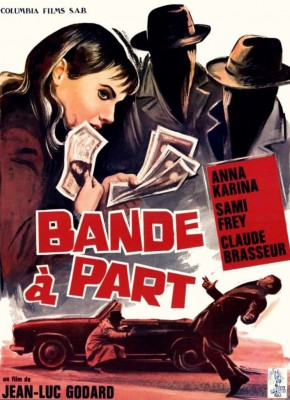
In a sense, it's that elemental, inexhaustible fascination in radically juxtaposing movement and stasis, artifice and realism, art and life, that's Godard's subject as much as unpredictable, treacherous, beguiling youthful romance and crime, or the Sixties' heady new cross-breeding love affair between "high" and "low" culture, and would remain the one constant in all his work, long after he forsook as untenable the playful, referential fandom with which Band of Outsiders is rife. But the more particular, paradoxical genius of this stage of Godard's filmmaking, so rapturously illustrated by Band of Outsiders' insouciant, tireless richness, was for creating lightness out of overload: The more heavily laden is Band of Outsiders with digression, fragmentation, references to other films and poetry and drama and immediately contemporary life and pop culture, all buzzing and bustling together, the more liberated/liberating, breezy, and "fun" it seems for its smartness. It could even be said that Band of Outsiders is the more thoroughly accomplished culmination of its predecessors in Godard's filmography, 1960's Bogart-obsessed movie-love letter Breathless (his debut feature) and 1961's free-roaming gender-politics "musical" A Woman is a Woman, nonchalantly executing even more impressive daredevil moves as it lands in, takes off from, and loops-the-loop away from its story to hungrily encompass as much as possible. "Friendly" is quite the relative term to try to apply to any Godard film, but, though Band of Outsiders is deeply Godardian -- i.e., inscrutable and frustrating if your mood is for a straightforward, traditionally well-told story -- it still probably is the friendliest, most accessible introductory masterpiece (to an early filmography that contains scarcely anything but), the key that best unlocks a whole new, perpetually bracing, modern, innovative, compelling, and provocative world of cinema as ongoing experiment, essay, collage -- the world of the inimitably masterful, audaciously iconoclastic Jean-Luc Godard.
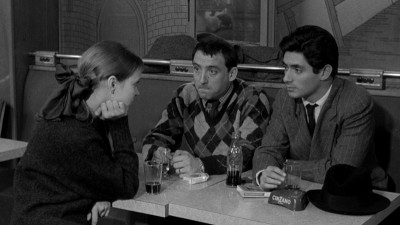
Video:
This new high-definition digital transfer of Band of Outsiders (undertaken in 2010, years after the prior DVD release), which presents the film at its original aspect ratio of 1.33:1, is a vast improvement on the old Criterion DVD, and looks quite fine overall. The film has a purposely lo-fi, "reportage" look, so "luminous" isn't the word, but its raw, quasi-documentary black-and-white beauty comes through as beautifully as possible here, with a healthy amount of celluloid grain/no egregious overuse of digital noise reduction (DNR) and -- whereas a quick comparison to my old DVD copy revealed, among other compression artifacts, that a stunning amount of edge enhancement had been utilized on the prior release -- no compression artifacts of any note were discernible at any point during the film on this edition. It's an excellent job that's left the film looking as cinematic as possible for home media.
Sound:The film's sound, like the images, was purposely taken on the fly and has an intentional roughness (or, perhaps better said, directness and immediacy) to it, but that shines through on the Blu-ray disc's uncompressed monaural PCM 1.0 soundtrack (in French with optional English subtitles), without any noticeable flaws owing to any carelessness in the audio mastering, so that one feels that one is really hearing the film's original sound with full fidelity and sonorousness, all particulars conscientiously preserved, and no hissing, popping, or other signs of age or wear to distract from the experience.
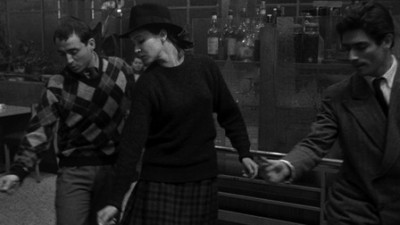
The new Blu-ray edition's supplements match, piece for piece, the extras included on Criterion's 2003 DVD release of the film, including:
--A visual glossary of cultural references (17 min.) Godard has, as typical for him, woven throughout the film, narrated by Robb Webb with accompanying clips from the film, helpfully and concisely explaining its teeming tidbits of connection to culture old and new, high and low, some obvious ("Rimbaud" is a reference to the poet) and some quite obscure (a visual pun referencing the then most-current Claude Chabrol film).
--New interviews with actress Anna Karina and cinematographer Raoul Coutard, both longtime Godard stalwarts (Karina was, of course, his wife for a few cinematically fecund years, and acted in most of his films during that period, with Coutard having shot 13 of Godard's films -- from Breathless to Weekend -- from his most famous and widely-regarded period), who delve into their rich memories of the singular experience of working (on the fly, most often, improvisationally, and with intense creativity) with the French New Wave's single greatest voice (if, as Coutard's and Karina's anecdotes serve to further illustrate, often tempestuous, demanding, and gnomic one, as well).
--About four minutes of rare behind-the scenes footage of Godard on the Band of Outsiders set excerpted from the 1964 French television documentary La Nouvelle Vague par ell-même.
--Les fiancés du pont Mac Donald (5 min.), a 1961 short film by Agnès Varda (embedded in her own feature-length New Wave gem from 1961, Cléo from Five to Seven) featuring Godard and Karina in a delightful, clever, and touching silent short-reel comedy pastiche.
--Two near-identical trailers for the film: One the original preview Godard cut for the film in 1964, the other for the Rialto re-release in 2001, which simply adds some titles before reiterating the original trailer in its entirety.
--A 25-page booklet featuring an erudite explication/appreciation of the film by poet and cultural critic Joshua Clover; Godard's own written character descriptions for the film's original press book, and a 1964 interview with Godard by Jean Collet centering around the then just-released Band of Outsiders.
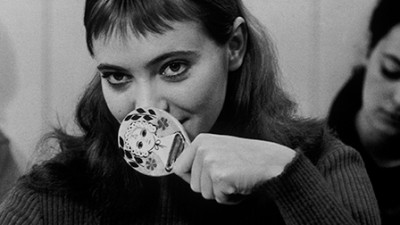
Less a love-triangle/heist/crime-romance story of desperate, romantic youth than a juiced and jazzed, overcaffeinated, exploratory and critical cinematic meditation on the same, Band of Outsiders is premier French New Wave filmmaker Jean-Luc Godard's singular mashup of Shakespeare, pulp crime fiction, Rimbaudian poetry, surrealism, and his (then) inveterate love of all cinema's fresh possibilities. It's as gorgeous and intoxicating as it is (intentionally) rough, fragmented, and detached, a bumpy ride that's unimaginable in any smoother or more conventional form. It's also very strong among the candidates for most lovable, purely and directly pleasurable Godard film. Though the great master had managed, and would manage again, to scale even greater, more audacious and ambitious heights with his cultural, political, historical, and aesthetic voraciousness, restlessness, and acuity, his vision has rarely been so unfettered, so breezily smart, fun, romantic, and clever in every which way, as it shows itself to be in Band of Outsiders. The film is an essential entry in the ever-unspooling (it continues to this day, with his next feature, Goodbye to Language, due out later this year) Godardian tapestry that is at once inviting and uniquely embraceable for the casual or new Godard fan and a perennial joy for his more die-hard adherents. Highly, highly recommended.
|
| Popular Reviews |
| Sponsored Links |
|
|
| Sponsored Links |
|
|
| Release List | Reviews | Shop | Newsletter | Forum | DVD Giveaways | Blu-Ray | Advertise |
|
Copyright 2024 DVDTalk.com All Rights Reserved. Legal Info, Privacy Policy, Terms of Use,
Manage Preferences,
Your Privacy Choices | |||||||









